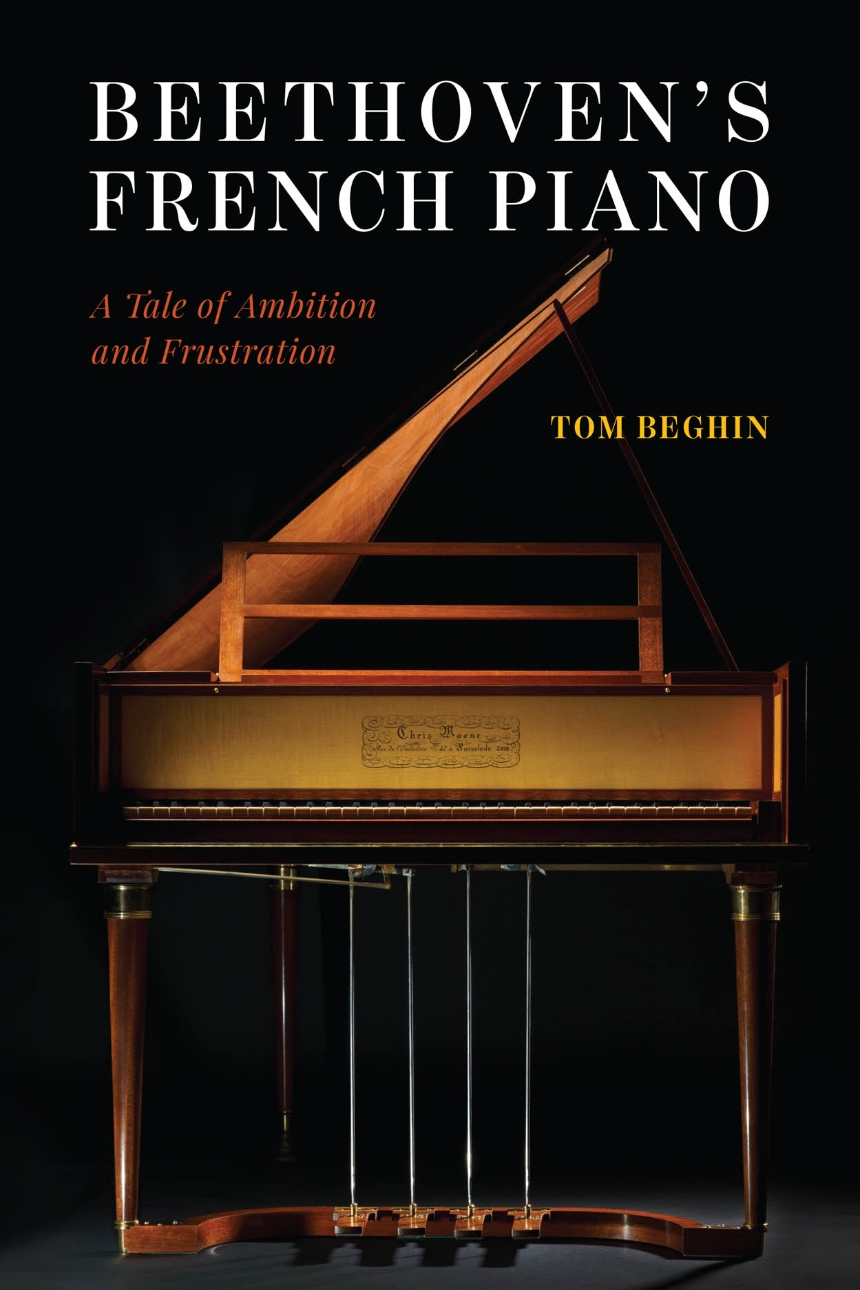Beethoven’s French Piano
A Tale of Ambition and Frustration
Using a replica of Beethoven’s Erard piano, scholar and performer Tom Beghin launches a striking reinterpretation of a key period of Beethoven’s work.
In 1803 Beethoven acquired a French piano from the Erard Frères workshop in Paris. The composer was “so enchanted with it,” one visitor reported, “that he regards all the pianos made here as rubbish by comparison.” While Beethoven loved its sound, the touch of the French keyboard was much heavier than that of the Viennese pianos he had been used to. Hoping to overcome this drawback, he commissioned a local technician to undertake a series of revisions, with ultimately disappointing results. Beethoven set aside the Erard piano for good in 1810.
Beethoven’s French Piano returns the reader to this period of Beethoven’s enthusiasm for all things French. What traces of the Erard’s presence can be found in piano sonatas like his “Waldstein” and “Appassionata”? To answer this question, Tom Beghin worked with a team of historians and musicians to commission the making of an accurate replica of the Erard piano. As both a scholar and a recording artist, Beghin is uniquely positioned to guide us through this key period of Beethoven’s work. Whether buried in archives, investigating the output of the French pianists who so fascinated Beethoven, or seated at the keyboard of his Erard, Beghin thinks and feels his way into the mind of the composer, bringing startling new insights into some of the best-known piano compositions of all time.
In 1803 Beethoven acquired a French piano from the Erard Frères workshop in Paris. The composer was “so enchanted with it,” one visitor reported, “that he regards all the pianos made here as rubbish by comparison.” While Beethoven loved its sound, the touch of the French keyboard was much heavier than that of the Viennese pianos he had been used to. Hoping to overcome this drawback, he commissioned a local technician to undertake a series of revisions, with ultimately disappointing results. Beethoven set aside the Erard piano for good in 1810.
Beethoven’s French Piano returns the reader to this period of Beethoven’s enthusiasm for all things French. What traces of the Erard’s presence can be found in piano sonatas like his “Waldstein” and “Appassionata”? To answer this question, Tom Beghin worked with a team of historians and musicians to commission the making of an accurate replica of the Erard piano. As both a scholar and a recording artist, Beghin is uniquely positioned to guide us through this key period of Beethoven’s work. Whether buried in archives, investigating the output of the French pianists who so fascinated Beethoven, or seated at the keyboard of his Erard, Beghin thinks and feels his way into the mind of the composer, bringing startling new insights into some of the best-known piano compositions of all time.
See a companion website for the book.
384 pages | 11 color plates, 37 halftones, 27 line drawings, 11 tables | 6 x 9 | © 2022
History: European History
Music: General Music
Reviews
Table of Contents
List of Illustrations
List of Abbreviations
Preface
Introduction. Parallel Tales
1. Aspirations and Entanglements
Vignette 1. The Letter
(by Tilman Skowroneck)
2. The Psychology of Waiting
3. Malleability of Tone
4. The Lure of una corda
Vignette 2. Two Visitors in Paris
(with Robin Blanton, Michael Pecak, and Tilman Skowroneck)
5. The Perfect Instrument
6. An Unlikely Competitor
7. Continuous Sound
Vignette 3. A Gift Not a Given
(with Robin Blanton)
8. The Vertical/Horizontal Paradox
9. A Grand Sonata
10. A Prize-Winning Teacher
Vignette 4. Building a Replica
(Chris Maene in conversation with Robin Blanton)
11. Revisiting the Revisions
12. Mixing Sound
Epilogue. Time and Resonance
Acknowledgments
Appendix A. Beethoven’s Erard: A Timeline
Appendix B. Op. 53, 54, and 57: A Timeline
Notes
Bibliography
Index
List of Abbreviations
Preface
Introduction. Parallel Tales
1. Aspirations and Entanglements
Vignette 1. The Letter
(by Tilman Skowroneck)
2. The Psychology of Waiting
3. Malleability of Tone
4. The Lure of una corda
Vignette 2. Two Visitors in Paris
(with Robin Blanton, Michael Pecak, and Tilman Skowroneck)
5. The Perfect Instrument
6. An Unlikely Competitor
7. Continuous Sound
Vignette 3. A Gift Not a Given
(with Robin Blanton)
8. The Vertical/Horizontal Paradox
9. A Grand Sonata
10. A Prize-Winning Teacher
Vignette 4. Building a Replica
(Chris Maene in conversation with Robin Blanton)
11. Revisiting the Revisions
12. Mixing Sound
Epilogue. Time and Resonance
Acknowledgments
Appendix A. Beethoven’s Erard: A Timeline
Appendix B. Op. 53, 54, and 57: A Timeline
Notes
Bibliography
Index
